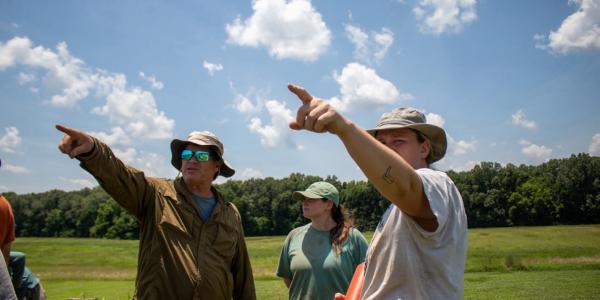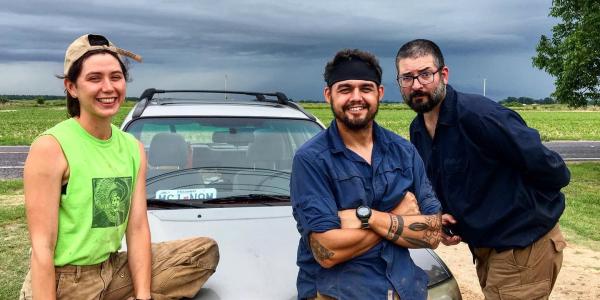Selected Publications
Kidder, Tristram R. and Haiwang Liu
2017 Bridging Theoretical Gaps in Geoarchaeology: Archaeology, Geoarchaeology and History in the Yellow River Valley, China. Archaeological and Anthropological Sciences 9:1585-1602. doi: 10.1007/s12520-014-0184-5 (published online March 2014).
http://rdcu.be/zszC
Kidder, Tristram R., Edward Henry, and Lee J. Arco
2017 Rapid climate change-induced collapse of hunter-gatherer societies in the lower Mississippi River valley between ca. 3300 and 2780 cal yr BP. Science China: Earth Sciences 60:1-1. doi:10.1007/s11430-017-9128-8.
Li, Lan, Zhu Cheng, Michael J. Storozum, and Tristram R. Kidder
2017 Relative sea-level Rise, site distributions and Neolithic settlement in the early to mid-Holocene, Jiangsu Province, China. The Holocene. doi: 10.1177/0959683617729442.
Storozum, Michael J., Zhen Qin, Haiwang Liu, Kui Fu, and Tristram R. Kidder
Storozum, Michael J., Zhen Qin, Liu Haiwang, and Tristram R. Kidder
2017 Early evidence of irrigation technology in the North China Plain: Geoarchaeological investigations at the Anshang site, Neihuang County, Henan Province, China. Geoarchaeology. doi:10.1002/gea.21634.
Storozum, Michael J., Duowen Mo, Hui Wang, Xiaolin Ren, Yifei Zhang, and Tristram R. Kidder
2017 Anthropogenic origins of a late Holocene, basin-wide, unconformity in the middle reaches of the Yellow River, the Luoyang Basin, Henan province, China. Quaternary Research. doi:10.1017/qua.2017.10.
Zhang, Yifei, Duowen Mo, Ke Hu, Wenbo Bao, Wenying Li, Abudurelsule Idilisi, Michael J. Storozum, and Tristram R. Kidder
2017 Holocene environmental change around Xiaohe Cemetery and its effects on human occupation, Xinjiang, China.
Zhuang, Yijei, Heejin Kim, and Tristram R. Kidder
2017 The cradle of heaven-human induction idealism: agricultural intensification, environmental consequences and social responses in Han China and Three-Kingdoms Korea. World Archaeology 48:563-585.
http://dx.doi.org/10.1080/00438243.2016.1251850.
Henry, Edward R., Anthony L., Ortmann, Lee J. Arco, and Tristram R. Kidder
Kidder, Tristram R., Haiwang Liu, Michael J. Storozum, and Zhen Qin
2016 New Perspectives on the Collapse and Regeneration of the Han Dynasty. In Beyond Collapse: Archaeological Perspectives on Resilience, Revitalization, and Transformation in Complex Societies, edited by Ronald K. Faulseit, pp. 70-98. Proceedings of the 29th Annual Visiting Scholar Conference, Center for Archaeological Investigations, Southern Illinois University in Carbondale.
Ren, Xiaolin, Ximena Lemoine, Duowen Mo, Tristram R. Kidder, Yuanyuan Guo, Zhen Qin, and Xinyi Liu
Kidder, Tristram R. and Sarah Sherwood
2016 Look to the Earth: The Search for Ritual in the Context of Mound Construction. Archaeological and Anthropological Sciences (DOI: 10.1007/s12520-016-0369-1).
Kidder, Tristram R. and Yijie Zhuang
2015 Anthropocene Archaeology of the Yellow River, China, 5000-2000 BP. The Holocene 25:1627-1639. DOI: 10.1177/0959683615594469.
Spivey, S. Margaret, Tristram R. Kidder, Anthony L. Ortmann, and Lee J. Arco
2015 Pilgrimage to Poverty Point? In The archaeology of events: Cultural change and continuity in the pre-Columbian Southeast, edited by Zackary I. Gilmore and Jason M. O’Donoughue, pp. 141-159. University of Alabama Press, Tuscaloosa.
Kidder, Tristram R. and Haiwang Liu
2014 Bridging Theoretical Gaps in Geoarchaeology: Archaeology, Geoarchaeology and History in the Yellow River Valley, China. Archaeological and Anthropological Sciences. DOI: 10.1007/s12520-014-0184-5.
Zhuang, Yijie, and Tristram R. Kidder
2014 Archaeology of the Anthropocene in the Yellow River, China, 8000-2000 cal. BP. The Holocene 24:1602-1623. DOI: 10.1177/0959683614544058.
Li, Tuoyu, Duowen Mo, Tristram R. Kidder, Yifei Zhang, Haibin Wang, and Yongqiu Wu
2014 Holocene environmental change and its influence on the prehistoric culture evolution and the formation of the Taosi site in Linfen Basin, Shanxi Province, China. Quaternary International 349: 402–408. DOI: 10.1016/j.quaint.2014.07.054






